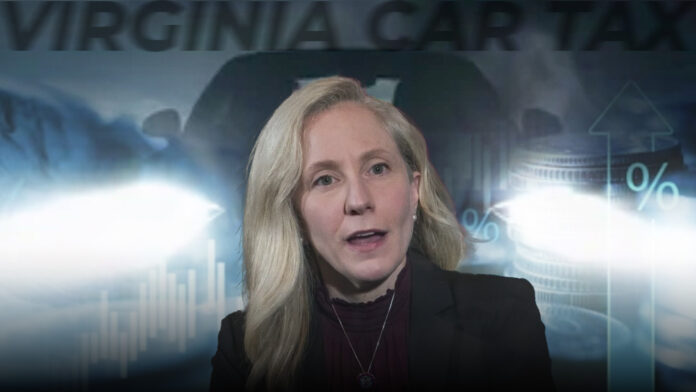Virginia voters, ratepayers, and taxpayers should be aware that if Abigail Spanberger is elected as their next governor, their energy bills will increase and their everyday purchases will also go up.
Spanberger said as much in a Podcast she gave last year to a professor of political science when she told him that if she became governor, she would join a climate-change initiative based on ” Cap and Trade ” regulations and carbon tax.
Spanberger has committed to the carbon-tax plan. Lt. , Winsome Earle Sears, her Republican opponent , supported Governor. Youngkin’s withdrawal. The candidates’ differing positions may become a major issue in the campaign, given how expensive RGGI has been for Virginia residents and could be in the future.
Glenn Youngkin is the Republican incumbent governor of Virginia. In 2023, he withdrew Virginia’s participation in the Regional Greenhouse Gas Initiative after describing it as a “regressive taxes on families and business.” Last November, a circuit court judge found that Youngkin’s actions had been unlawful. The state will not be a part of RGGI until Youngkin has appealed the ruling. The outcome of the gubernatorial elections in Virginia this year could determine RGGI’s future.
High Costs without Environmental Benefits
RGGI includes 11 New England states and mid-Atlantic where regulators impose a “cap” or upper limit on the amount carbon dioxide emissions power plants are allowed to emit. The initiative creates allowances within interstate auctions, which can be traded between companies that are subject to emission caps. The “cap-and-trade” plan includes a carbon tax in the price of fossil energy that is passed on to consumers. Virginia joined RGGI under Democratic Governor Ralph Northam in 2020, who approved legislation passed by the Democrat-controlled General Assembly. Virginia was the first state in the south to join the initiative. Since then, RGGI’s effectiveness has been questioned.
David Stevenson, Director of the Center for Energy & Environment of the Caesar Rodney Institute, Delaware, gave public remarks in support of Youngkin’s decision to leave the initiative in march 2023.
Virginia’s electric generation dropped 12% between 2020 and 2022. The regional grid’s power imports grew from 12 to 30 percent of the demand, and they expect power shortages in 2030. The CO2 emissions in the state fell by 6.6 millions metric tons between 2020 and 2022. However, increased electricity imports caused emissions to increase elsewhere by 10.3 million tonnes for a total of 3.7 million tons. The $523 million in RGGI revenues will be added to the electric bill, while state generators lose $840 million of electric generation revenue. Virginia could lose $25 billion over the next decade due to RGGI. Virginia must abandon RGGI.
RGGI did not reduce emissions in Virginia, and created a net gain. This increased energy costs for the consumers. Stevenson explains that any CO2 reductions in Virginia were far outweighed by the increased costs of importing electricity from states outside of RGGI. Since Spanberger is determined to bring Virginia back into RGGI, voters should insist that she address the increasing costs of these carbon auctions.
Stevenson compiled figures from RGGI which showed that allowance prices in 2022 averaged $13.46/ton and ended the year $13, adding $128 million to electric bills. RGGI predicts that prices may rise as high as $24/ton in 2030.
Spanberger stated during the podcast that “it would be a top priority for me to have Virginia join RGGI …”.” She says the multi-state agreement on climate change will enable Virginia to “meet its clean energy goals.”
Stevenson’s facts and figures show that Spanberger’s carbon tax plan would increase energy costs in Virginia, without producing any environmental benefit.
Stephen D. Haner is a senior fellow for energy and environment policy at the Thomas Jefferson Institute for Public Policy. He has identified another problem in his study. RGGI could put Virginia into a situation where it becomes more dependent on imported electricity from other states. Haner warns that this would be especially true when wind and solar energy enter low-production phases.
Do Dems hate Reliable Energy?
Spanberger’s support of carbon taxes is in line with her anti-energy stance she adopted as a Congresswoman. Spanberger’s support for carbon taxes is in line with the anti-energy stance she adopted as a member of Congress. Spanberger voted against a Bill which required the Department of Energy consider the cost-effectiveness of new policy standards. The legislation would require the Department of Energy to consider the impact that mandatory home appliance upgrades have on low-income households.
The decision to join RGGI will come with a high price for Virginian families, as they already have to deal with the aftermath of the Virginia Clean Economy Act. The Virginia Green New Deal. Haner, as reported by Restoration News in a previous report, expects a rate increase of almost 50% for Virginians within the next two-years, largely due to the green energy mandates imposed by the VCEA that went into effect 2020.
Spanberger, if elected Virginia governor, seems to be poised to deliver a two-pronged attack on Virginia ratepayers. He would impose RGGI carbon taxes in addition the spiraling costs associated with the VCEA. Winsome Earle Sears can exploit this weakness in her upcoming campaign.
NEWSLETTER SIGNUP
Subscribe to our newsletter! Get updates on all the latest news in Virginia.


